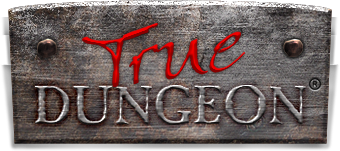jon wrote: Can you give an example of how these will play out? Not a patron but may effect me in grind or will have to do one if each at gencon.
One common occurrence in Grind is that newbie parties will sign up for Grind thinking it's a normal dungeon. In those cases, they might be less impressed with just constant sliding and want a little more interaction.
In Grind, I've always built in lots of Easter Eggs and mini-puzzles but in sliding-heavy runs, those aren't really explored. Grind and Horde groups with newer and more casual players have a higher risk of getting killed early on in the adventure. But one way to play things out is to encourage groups (who don't really have the DPS firepower) to explore more creative solutions and find alternate ways to defeat the monsters. Last year for example, there were some creative ways to identify Loki (the best one involved the Chalk gear) rather than just sequentially attacking who they think might be Loki.
Ro-gan wrote: Maybe I'm missing something... but True Grind and True Horde is always about combat, combat, combat and... oh yeah... combat.
If a person wants roleplaying that is what the adventures are for. Has this changed in the last year?!?
There have always been some roleplaying and some puzzle elements to Grind. Though certain modes of play can often bypass them.
Take for example, 2 years again in the Grind in Sigil. Blindly accepting all of the missions you were given had consequences. And, uh, the encounter with the Lady of Pain.
Fiddy wrote:
lazlo_hollyfeld1985 wrote: the paperwork I had to do in the other room last year while combat was going, I did not like. That was more of a puzzle than combat or roleplaying
Was that the spellcaster paperwork? I don't think anyone was a fan of that. 
There were two different effects. A Maze effect (where you had to leave the room and do a maze) and a Curse of Bureaucratic Wizardry curse on spellcasters (where you had to fill out paperwork to cast a spell).
Actually, there were some players who enjoyed that. One of them even asked to keep some of the forms he filled out as a souvenir.
The sliding focused players don't really like these effects because it takes them out of the sliding action. Some of the more role-playing oriented players actually enjoy these unique experiences. So these puzzle-y effects would be used more frequently in a story-based mode and less frequently in a hack and slash mode. I recall that Matthew Hayward wasn't particularly pleased to be Mazed either.
jedibcg wrote: I really didn't like that it had to do with knowledge of DnD. I had started playing DnD and no idea what school of magic a spell was.
DnD knowledge is never required but it can often be helpful. In this case, you could always ask other people or do trial and error.
In TD and Grind, DnD knowledge, monster lore, and knowledge of mythology can often be helpful. If you know what type of monster you are facing, you know what types of attacks to expect. DnD knowledge would have helped in knowing how to deal with the Lady of Pain. Norse mythology lore (and some players did actually know quite a lot) was helpful in deal with "Loki" and Ratatoskr the squirrel.
Fiddy wrote: I think with the added complexity of twice as many people running around, Horde is a different beast though. That may be too many moving pieces for the same things to work that work well in Grind.
Last year there were several people who signed up for True Horde not knowing what they were getting into. Getting slaughtered by the LoriGorgon early on, wasn't particularly enjoyable for them. These are the type of players who would be more interested in a story-mode as opposed to hack and slash mode.





